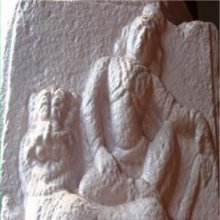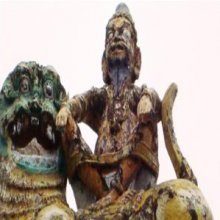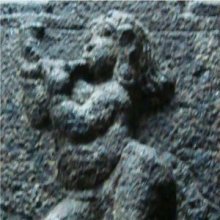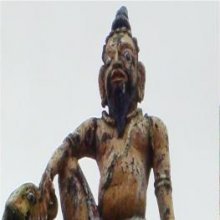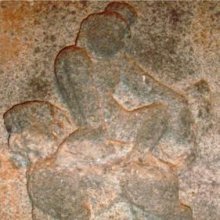Anatha, Anātha: 22 definitions
Introduction:
Anatha means something in Buddhism, Pali, Hinduism, Sanskrit, Jainism, Prakrit, the history of ancient India, Marathi, Hindi. If you want to know the exact meaning, history, etymology or English translation of this term then check out the descriptions on this page. Add your comment or reference to a book if you want to contribute to this summary article.
Alternative spellings of this word include Anath.
Images (photo gallery)
In Hinduism
Shaktism (Shakta philosophy)
Source: Google Books: ManthanabhairavatantramAnātha (अनाथ) refers to “(being) without lord” and is used to describe Kaula, according to the Manthānabhairavatantra, a vast sprawling work that belongs to a corpus of Tantric texts concerned with the worship of the goddess Kubjikā.—Accordingly, [while expounding Kaula and the Nine Kaulas]—“Devoid of (phenomenal) being, without lord (anātha), I praise Kaula, which is ever manifest. Free of Dharma and Adharma, liberation and bondage, I praise Kaula; non-dual, omnipresent and eternal, it is (both) supreme (transcendent) and inferior (immanent)”.

Shakta (शाक्त, śākta) or Shaktism (śāktism) represents a tradition of Hinduism where the Goddess (Devi) is revered and worshipped. Shakta literature includes a range of scriptures, including various Agamas and Tantras, although its roots may be traced back to the Vedas.
Purana and Itihasa (epic history)
Source: archive.org: Shiva Purana - English TranslationAnātha (अनाथ) refers to the “helpless”, according to the Śivapurāṇa 2.5.19 (“Jalandhara’s emissary to Śiva”).—Accordingly, after Rāhu spoke to Śiva: “On hearing the words of the brahmin, the great lord, favourite of the distressed and helpless [e.g., anātha-priya], spoke to his Gaṇa.—‘Leave off this brahmin Rāhu, the emissary who has sought refuge. O excellent Gaṇa, those who seek shelter shall be protected, not punished’”.

The Purana (पुराण, purāṇas) refers to Sanskrit literature preserving ancient India’s vast cultural history, including historical legends, religious ceremonies, various arts and sciences. The eighteen mahapuranas total over 400,000 shlokas (metrical couplets) and date to at least several centuries BCE.
In Buddhism
Theravada (major branch of Buddhism)
Source: Pali Kanon: Pali Proper NamesA Pacceka Buddha of thirty one kappas ago. Uddalapupphiya Thera, in a previous birth, offered him an uddala flower. Ap.i.288.
Theravāda is a major branch of Buddhism having the the Pali canon (tipitaka) as their canonical literature, which includes the vinaya-pitaka (monastic rules), the sutta-pitaka (Buddhist sermons) and the abhidhamma-pitaka (philosophy and psychology).
Tibetan Buddhism (Vajrayana or tantric Buddhism)
Source: Wisdom Library: Tibetan BuddhismAnātha (अनाथ) is the name of a Bodhisattva mentioned as attending the teachings in the 6th century Mañjuśrīmūlakalpa: one of the largest Kriyā Tantras devoted to Mañjuśrī (the Bodhisattva of wisdom) representing an encyclopedia of knowledge primarily concerned with ritualistic elements in Buddhism. The teachings in this text originate from Mañjuśrī and were taught to and by Buddha Śākyamuni in the presence of a large audience (including Anātha).

Tibetan Buddhism includes schools such as Nyingma, Kadampa, Kagyu and Gelug. Their primary canon of literature is divided in two broad categories: The Kangyur, which consists of Buddha’s words, and the Tengyur, which includes commentaries from various sources. Esotericism and tantra techniques (vajrayāna) are collected indepently.
In Jainism
General definition (in Jainism)
Source: The University of Sydney: A study of the Twelve ReflectionsAnātha (अनाथ) refers to the “helpless”, according to the 11th century Jñānārṇava, a treatise on Jain Yoga in roughly 2200 Sanskrit verses composed by Śubhacandra.—Accordingly, “That very same doctrine, which is devoted to the helpless (anātha-vatsala), is a preceptor and a friend, and the doctrine is a master and a brother. It is a protector without a motive. This doctrine saves the three worlds [from] sinking into the pit of hell. Also, it confers happiness beyond the senses for corporeal [souls]”.

Jainism is an Indian religion of Dharma whose doctrine revolves around harmlessness (ahimsa) towards every living being. The two major branches (Digambara and Svetambara) of Jainism stimulate self-control (or, shramana, ‘self-reliance’) and spiritual development through a path of peace for the soul to progess to the ultimate goal.
India history and geography
Source: Singhi Jain Series: Ratnaprabha-suri’s Kuvalayamala-katha (history)Anātha (अनाथ) in Sanskrit refers to the Prakrit Aṇāha (Cf. Aṇāhamaṇḍava—“poor homes”), as mentioned in the Uddyotanasūri in his 8th-century Kuvalayamālā (a Prakrit Campū, similar to Kāvya poetry).—The Kuvalayamala (779 A.D.) is full of cultural material which gains in value because of the firm date of its composition. [...] On page 55.11 f., there is a description of poor home (aṇāha-maṇḍava) in the city of Mathurā. In its population there was a sprinkling of disabled persons: [...]

The history of India traces the identification of countries, villages, towns and other regions of India, as well as mythology, zoology, royal dynasties, rulers, tribes, local festivities and traditions and regional languages. Ancient India enjoyed religious freedom and encourages the path of Dharma, a concept common to Buddhism, Hinduism, and Jainism.
Languages of India and abroad
Pali-English dictionary
Source: BuddhaSasana: Concise Pali-English Dictionaryanātha : (adj.) miserable; helpless; destitute.

Pali is the language of the Tipiṭaka, which is the sacred canon of Theravāda Buddhism and contains much of the Buddha’s speech. Closeley related to Sanskrit, both languages are used interchangeably between religions.
Marathi-English dictionary
Source: DDSA: The Molesworth Marathi and English Dictionaryanātha (अनाथ).—a (S) That is without a master or protector; forlorn, friendless, destitute. Ex. mī a0 nirāśraya saṃsārī || apaṅgahī asē sarvāpari || anāthanātha Friend of the friendless. anāthabandhu Brother of the destitute; protector of the helpless. anāthapālana, anāthapūjā, anāthabhōjana, anātha- samācāra, anāthasēvā, anāthavatsala &c.
Source: DDSA: The Aryabhusan school dictionary, Marathi-Englishanātha (अनाथ).—a Friendless, helpless, forlorn, destitute. anāthanātha Friend of the friendless.
Marathi is an Indo-European language having over 70 million native speakers people in (predominantly) Maharashtra India. Marathi, like many other Indo-Aryan languages, evolved from early forms of Prakrit, which itself is a subset of Sanskrit, one of the most ancient languages of the world.
Sanskrit dictionary
Source: DDSA: The practical Sanskrit-English dictionaryAnātha (अनाथ).—a. [na. ba.] Helpless, poor, forlorn, parentless, orphan (as a child); widowed (as a wife); having no master or natural protector, without a protector in general; नाथवन्तस्त्वया लोकास्त्वमनाथा विपत्स्यसे (nāthavantastvayā lokāstvamanāthā vipatsyase) Uttararāmacarita 1.43; R. 12.12.
-tham Ved. Helplessness. किं भ्रातासद्यदनाथं भवाति (kiṃ bhrātāsadyadanāthaṃ bhavāti) | Ṛgveda 1.1.11.
Source: Cologne Digital Sanskrit Dictionaries: Shabda-Sagara Sanskrit-English DictionaryAnātha (अनाथ).—mfn.
(-thaḥ-thā-thaṃ) Without a master or protector, without a husband, &c. E. a neg. nātha master.
Source: Cologne Digital Sanskrit Dictionaries: Benfey Sanskrit-English DictionaryAnātha (अनाथ).—adj., f. thā, having no protector, helpless, [Rāmāyaṇa] 6, 23, 21.
Anātha is a Sanskrit compound consisting of the terms a and nātha (नाथ).
Source: Cologne Digital Sanskrit Dictionaries: Cappeller Sanskrit-English DictionaryAnātha (अनाथ).—1. [adjective] having no protector, helpless.
--- OR ---
Anātha (अनाथ).—2. [neuter] helplessness.
Source: Cologne Digital Sanskrit Dictionaries: Monier-Williams Sanskrit-English Dictionary1) Anātha (अनाथ):—[=a-nātha] mf(ā)n. having no master or protector
2) [v.s. ...] widowed
3) [v.s. ...] fatherless
4) [v.s. ...] helpless, poor
5) [v.s. ...] n. want of a protector, helplessness, [Ṛg-veda x, 10, 11.]
Source: Cologne Digital Sanskrit Dictionaries: Goldstücker Sanskrit-English DictionaryAnātha (अनाथ):—[bahuvrihi compound] m. f. n.
(-thaḥ-thā-tham) 1) Without a lord or protector (as an orphan, one without a sapiṇḍa (q. v.) &c.), without a master.
2) Helpless, poor. E. a priv. and nātha.
Source: Cologne Digital Sanskrit Dictionaries: Yates Sanskrit-English DictionaryAnātha (अनाथ):—[anā+tha] (thaḥ-thā-thaṃ) a. Destitute, widowed, without a husband.
Source: DDSA: Paia-sadda-mahannavo; a comprehensive Prakrit Hindi dictionary (S)Anātha (अनाथ) in the Sanskrit language is related to the Prakrit word: Aṇāha.
[Sanskrit to German]
Sanskrit, also spelled संस्कृतम् (saṃskṛtam), is an ancient language of India commonly seen as the grandmother of the Indo-European language family (even English!). Closely allied with Prakrit and Pali, Sanskrit is more exhaustive in both grammar and terms and has the most extensive collection of literature in the world, greatly surpassing its sister-languages Greek and Latin.
Hindi dictionary
Source: DDSA: A practical Hindi-English dictionaryAnātha (अनाथ) [Also spelled anath]:—(nm) an orphan; (a) orphan, without any protector; helpless.
...
Kannada-English dictionary
Source: Alar: Kannada-English corpusAnātha (ಅನಾಥ):—
1) [adjective] helpless; forlorn; lacking a supporter; destitute.
2) [adjective] parentless; orphan.
--- OR ---
Anātha (ಅನಾಥ):—
1) [noun] a helpless, forlorn, boy or man; a destitute.
2) [noun] a parentless child; an orphan.
Kannada is a Dravidian language (as opposed to the Indo-European language family) mainly spoken in the southwestern region of India.
See also (Relevant definitions)
Starts with (+15): Anata-pallikutam, Anatai, Anatam, Anatappillai, Anatappiretam, Anataram, Anataratcakar, Anataravu, Anatari, Anatha-samrakshana, Anathabalagriha, Anathabamdhu, Anathada, Anathalay, Anathalaya, Anathamandapa, Anathamta, Anathapindada, Anathapindika, Anathapindika Putta.
Ends with (+362): Abhinandananatha, Acalanatha, Adharanatha, Adhilokanatha, Advayanandanatha, Adyanatha, Ajitanatha, Alabdhanatha, Alalanatha, Allalanatha, Amaranatha, Amardakatirthanatha, Ambaranatha, Amitanatha, Amnayanatha, Amritanandanatha, Amritanatha, Anadikanatha, Anahatanatha, Anandanandanatha.
Full-text (+14): Anathasabha, Anathya, Anathapindika, Anathapindada, Anaha, Uddalapupphiya, Anatha-samrakshana, Anath, Sumagadha, Kevulavana, Kevalavana, Anata-pallikutam, Kamaica Hina, Apanga, Pindada, Anatai, Natha, Vatsala, Vinayaka, Anaran.
Relevant text
Search found 28 books and stories containing Anatha, Anātha, A-natha, A-nātha; (plurals include: Anathas, Anāthas, nathas, nāthas). You can also click to the full overview containing English textual excerpts. Below are direct links for the most relevant articles:
Garga Samhita (English) (by Danavir Goswami)
Verse 4.14.13 < [Chapter 14 - The Story of the Jālandharīs]
Verses 1.2.3-4 < [Chapter 2 - Description of the Abode of Śrī Goloka]
Rig Veda (translation and commentary) (by H. H. Wilson)
Rig Veda 10.10.11 < [Sukta 10]
The Jataka tales [English], Volume 1-6 (by Robert Chalmers)
Jataka 90: Akataññu-jātaka < [Book I - Ekanipāta]
Jataka 53: Puṇṇapāti-jātaka < [Book I - Ekanipāta]
Jataka 121: Kusanāḷi-jātaka < [Book I - Ekanipāta]
Frontispiece < [July-August, 1929]
Tagore: Formative Influences < [April 1957]
Tagore: Formative Influences < [April 1957]
Vinaya (3): The Cullavagga (by T. W. Rhys Davids)
Cullavagga, Khandaka 6, Chapter 4 < [Khandaka 6 - On Dwellings and Furniture]
Cullavagga, Khandaka 6, Chapter 9 < [Khandaka 6 - On Dwellings and Furniture]
Cullavagga, Khandaka 5, Chapter 22 < [Khandaka 5 - On the Daily Life of the Bhikkhus]
Sahitya-kaumudi by Baladeva Vidyabhushana (by Gaurapada Dāsa)
Text 10.202 < [Chapter 10 - Ornaments of Meaning]
